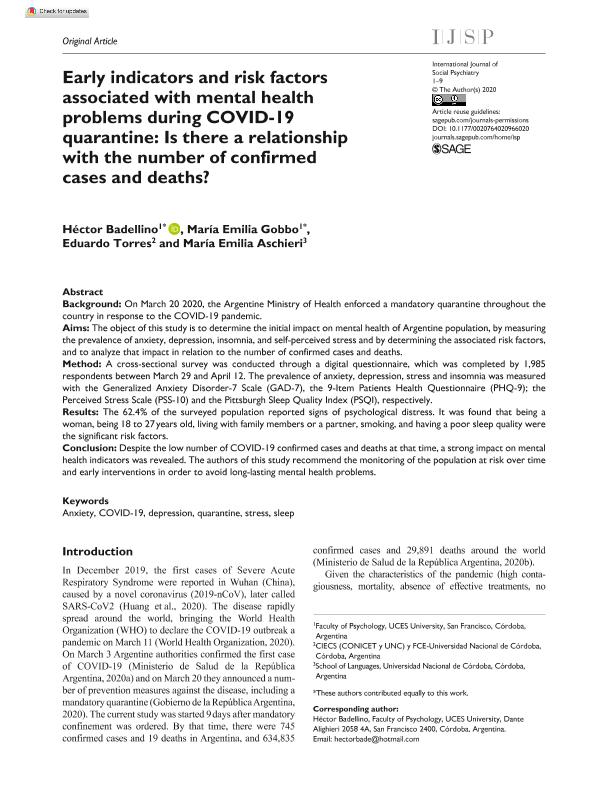Mostrar el registro sencillo del ítem
dc.contributor.author
Badellino, Héctor
dc.contributor.author
Gobbo, María Emilia
dc.contributor.author
Torres, Victor Eduardo Roque

dc.contributor.author
Aschieri, María Emilia
dc.date.available
2021-07-07T16:10:08Z
dc.date.issued
2020-10
dc.identifier.citation
Badellino, Héctor; Gobbo, María Emilia; Torres, Victor Eduardo Roque; Aschieri, María Emilia; Early indicators and risk factors associated with mental health problems during COVID-19 quarantine: Is there a relationship with the number of confirmed cases and deaths?; Sage Publications Ltd; The International Journal Of Social Psychiatry.; 10-2020; 1-9
dc.identifier.issn
0020-7640
dc.identifier.uri
http://hdl.handle.net/11336/135660
dc.description.abstract
Background: On March 20 2020, the Argentine Ministry of Health enforced a mandatory quarantine throughout the country in response to the COVID-19 pandemic. Aims: The object of this study is to determine the initial impact on mental health of Argentine population, by measuring the prevalence of anxiety, depression, insomnia, and self-perceived stress and by determining the associated risk factors, and to analyze that impact in relation to the number of confirmed cases and deaths. Method: A cross-sectional survey was conducted through a digital questionnaire, which was completed by 1,985 respondents between March 29 and April 12. The prevalence of anxiety, depression, stress and insomnia was measured with the Generalized Anxiety Disorder-7 Scale (GAD-7), the 9-Item Patients Health Questionnaire (PHQ-9); the Perceived Stress Scale (PSS-10) and the Pittsburgh Sleep Quality Index (PSQI), respectively. Results: The 62.4% of the surveyed population reported signs of psychological distress. It was found that being a woman, being 18 to 27 years old, living with family members or a partner, smoking, and having a poor sleep quality were the significant risk factors. Conclusion: Despite the low number of COVID-19 confirmed cases and deaths at that time, a strong impact on mental health indicators was revealed. The authors of this study recommend the monitoring of the population at risk over time and early interventions in order to avoid long-lasting mental health problems.
dc.format
application/pdf
dc.language.iso
eng
dc.publisher
Sage Publications Ltd

dc.rights
info:eu-repo/semantics/openAccess
dc.rights.uri
https://creativecommons.org/licenses/by/2.5/ar/
dc.subject
ANXIETY
dc.subject
COVID-19
dc.subject
DEPRESSION
dc.subject
QUARANTINE
dc.subject
SLEEP
dc.subject
STRESS
dc.subject.classification
Demografía

dc.subject.classification
Sociología

dc.subject.classification
CIENCIAS SOCIALES

dc.title
Early indicators and risk factors associated with mental health problems during COVID-19 quarantine: Is there a relationship with the number of confirmed cases and deaths?
dc.type
info:eu-repo/semantics/article
dc.type
info:ar-repo/semantics/artículo
dc.type
info:eu-repo/semantics/publishedVersion
dc.date.updated
2021-07-07T15:15:03Z
dc.journal.pagination
1-9
dc.journal.pais
Reino Unido

dc.description.fil
Fil: Badellino, Héctor. No especifíca;
dc.description.fil
Fil: Gobbo, María Emilia. No especifíca;
dc.description.fil
Fil: Torres, Victor Eduardo Roque. Consejo Nacional de Investigaciones Científicas y Técnicas. Centro Científico Tecnológico Conicet - Córdoba. Centro de Investigaciones y Estudios sobre Cultura y Sociedad. Universidad Nacional de Córdoba. Centro de Investigaciones y Estudios sobre Cultura y Sociedad; Argentina
dc.description.fil
Fil: Aschieri, María Emilia. Universidad Nacional de Córdoba; Argentina
dc.journal.title
The International Journal Of Social Psychiatry.

dc.relation.alternativeid
info:eu-repo/semantics/altIdentifier/doi/http://dx.doi.org/10.1177/0020764020966020
dc.relation.alternativeid
info:eu-repo/semantics/altIdentifier/url/https://journals.sagepub.com/doi/10.1177/0020764020966020
Archivos asociados
